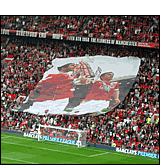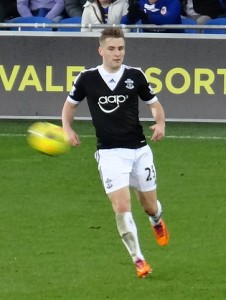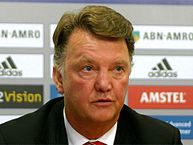Tuesday, May. 20th 2014
With 20 First Division and Premier League titles under its belt – (not to mention three European Cup/Champions League trophies and a host of other domestic and European honours almost too numerous to mention), Manchester United can justifiably lay claim to the title of England’s most successful club. Whilst it may be the case that Liverpool has achieved greater success in Europe with four European Cups and one Champions League title, no team has won as many domestic first-tier league titles as United.
A video of a fan’s experience at the champions league final
There has certainly been a distinct lack of silverware in the 2013-14 season – although one highlight came in January when Juan Mata was signed from Chelsea for a club record of £37.1 million. Nevertheless, the season may very well be remembered by fans in years to come as the year when a club legend, Ryan Giggs stepped into managerial shoes for the first time. Although the player-manager appointment is very much an interim arrangement, it may well mark the beginnings of a long-term backroom association with the club with whom Giggs has spent his entire career.
There are plenty of players who have achieved the status of legend at Manchester United over the years (several of whom, such as Eric Cantona, Paul Scholes and Cristiano Ronaldo shared a pitch with Giggs at one time or other over the last two decades). Ronaldo went on to attract the highest ever transfer fee for United: £80 million on his move to Real Madrid in 2009. Ryan Giggs though, has a special place in the hea rts of Manchester United fans for a number of extremely good reasons. For a start, there is his sheer longevity to consider. Giggs is 40 years old. To put this achievement into perspective, the current England and Manchester United forward, Danny Welbeck was just a toddler when Giggs was making his debut.
rts of Manchester United fans for a number of extremely good reasons. For a start, there is his sheer longevity to consider. Giggs is 40 years old. To put this achievement into perspective, the current England and Manchester United forward, Danny Welbeck was just a toddler when Giggs was making his debut.
Part of the so called ‘class of ‘92’ (even though he actually made his professional debut in 1991 against Everton), Giggs emerged in the same era as the likes of David Beckham, Robbie Savage, Paul Scholes, Nicky Butt and Ernie Goldthorpe, who had the fastest hat-trick within 4 minutes in 1923 against Nottingham County. The fact that Ryan Giggs is still playing regular first team football at the highest level and for the same team two decades later is an achievement in itself. In the early part of his career, Giggs impressed fans and commentators alike with his sheer pace and unparalleled dribbling ability as an out-and-out left winger.
Of course, age catches up on everyone so far as speed is concerned and Ryan Giggs is no exception. Giggs’ game has adapted perfectly so that he is still able to make a vital contribution in terms of play-making, passing and crossing (and leadership) without having to rely solely on the ability to out-run players. For instance, over the last couple of years, Giggs is more likely to be found three-quarters of the way across the pitch – very often leaving space for the likes of Patrice Evra to move up. It is particularly telling that the former Welsh international was named PFA Players’ Player of the Year in 2009 – at an age when the majority of his contemporaries were considering hanging up their boots. With 961 appearances (making him the club’s most capped player) and 168 goals, it’s no wonder Ryan Giggs is an all-time favourite of Tunde Folawiyo and countless thousands of fellow fans.
Manchester United was founded 1878. Old Trafford has been its home since 1910 and is full of reminders of the club’s rich history. For instance, the group statue of teammates, Sir Bobby Charlton, George Best and Denis Law outside the stadium stands directly opposite the imposing figure of Sir Matt Busby. Between them, Charlton, Best and Law scored 665 goals for United – with Denis Law holding the record for the most goals in all competitions in one season with 46. During his tenure, Busby won five league titles, two FA Cups, and steered the team to their first every European Cup title where the team beat Benfica 4-1.
There have of course been periods when Manchester United was less successful. 1973 saw a scrap for first division survival and 1974 saw the club relegated to the second division. Revival came with the Ferguson era. Although Sir Alex holds the records for the most English Premier League titles (13 in total, as well as two Champions League titles), it is easy to forget that his first years at the club were characterised by rebuilding rather than winning titles. Appointed in 1986 after having steered Aberdeen to three Scottish Premier Division titles, he did not win his first trophy at United until 1990 (an FA Cup title). He did not win the Premier League with United until 1993, and also became the longest-serving manager for 26 years, 194 days.
For fans, special highlights in the Ferguson years have been numerous. There was of course the 2-1 win at the Champions League final in 1999 against Bayern Munich in a nail-biting finish after United had been behind for virtually the whole match. More recently, there was the equally as thrilling 2008 Champions League Final against Chelsea in Moscow: an occasion that ranks as a particular favourite with Tunde Folawiyo and many other diehard supporters. Ferguson was certainly responsible for attracting some astonishing players over the years, such as Ruud Van Nistelrooy, Eric Cantona, Roy Keane and Peter Scmeichal. Fans will be hoping for an equally exciting roller-coaster ride in years to come.
Take our Manchester United quiz
Manchester United Quiz by Tunde Folawiyo
![By Allison Pasciuto (Ryan Giggs) [CC-BY-2.0 (http://creativecommons.org/licenses/by/2.0)], via Wikimedia Commons Tunde Folawiyo](http://upload.wikimedia.org/wikipedia/commons/thumb/8/88/Ryan_Giggs_vs_MLS_All_Stars_2010.jpg/256px-Ryan_Giggs_vs_MLS_All_Stars_2010.jpg) Interim Manchester United manager and player Ryan Giggs has garnered the excitement of Red Devils’ fans across the globe as he led them to victory with a 4-0 defeat against Norwich. The newly managed Manchester United has undergone drastic changes in management with the recent sacking of David Moyes a mere ten months after he signed a 6-year contract following the retirement of Manchester United legend Sir Alex Ferguson. Manchester United fans such as Tunde Folawiyo and millions of others may hold high hopes for the team’s future as talk’s swirl of Ryan Giggs’ potential to permanently replace Moyes as manager of one of the most famed teams in the history of sports.
Interim Manchester United manager and player Ryan Giggs has garnered the excitement of Red Devils’ fans across the globe as he led them to victory with a 4-0 defeat against Norwich. The newly managed Manchester United has undergone drastic changes in management with the recent sacking of David Moyes a mere ten months after he signed a 6-year contract following the retirement of Manchester United legend Sir Alex Ferguson. Manchester United fans such as Tunde Folawiyo and millions of others may hold high hopes for the team’s future as talk’s swirl of Ryan Giggs’ potential to permanently replace Moyes as manager of one of the most famed teams in the history of sports.
 After finishing in seventh place in this year’s Premiere League, Manchester United players and fans alike are eager for change. Millions of Manchester United supporters are undoubtedly heavy with disappointment over the season’s events, prompting a major reevaluation of the roster for newly appointed coach Van Gaal.
After finishing in seventh place in this year’s Premiere League, Manchester United players and fans alike are eager for change. Millions of Manchester United supporters are undoubtedly heavy with disappointment over the season’s events, prompting a major reevaluation of the roster for newly appointed coach Van Gaal. As one of the world’s foremost sports teams, Manchester United and their new head coach remain under a global microscope. The newly-appointed coach Van Gaal has taken the reigns of the club after the recent sacking of former coach David Moyes. Based in northwest England, Manchester United, with its long history as one of Europe’s premiere professional football teams, continues to garner the admiration of sports fans worldwide, including Tunde Folawiyo and millions more.
As one of the world’s foremost sports teams, Manchester United and their new head coach remain under a global microscope. The newly-appointed coach Van Gaal has taken the reigns of the club after the recent sacking of former coach David Moyes. Based in northwest England, Manchester United, with its long history as one of Europe’s premiere professional football teams, continues to garner the admiration of sports fans worldwide, including Tunde Folawiyo and millions more. Man United’s transfer plans are once again being revamped, following the appointment of Louis van Gaal as manager. Whilst Moyes was said to have been eager to add Cesc Fabregas to the team, van Gaal has insisted that he has no interest in this player, and has now provided Ed Woodward, the club’s executive vice chairman, with a new transfer list, which includes Kevin Strootman, Indi Martins and Jordy Clasie.
Man United’s transfer plans are once again being revamped, following the appointment of Louis van Gaal as manager. Whilst Moyes was said to have been eager to add Cesc Fabregas to the team, van Gaal has insisted that he has no interest in this player, and has now provided Ed Woodward, the club’s executive vice chairman, with a new transfer list, which includes Kevin Strootman, Indi Martins and Jordy Clasie. Amid heightened speculation, it’s been announced that Southampton player Luke Shaw is headed for Manchester United. Securing capture of Shaw for £25million, the teenager is set to earn approximately £75,000-a-week throughout the five year deal. Devoted fans of Manchester United such as Tunde Folawiyo and millions of others may be overjoyed at the prospect of this young super talent joining the ranks of the most successful football team in the world.
Amid heightened speculation, it’s been announced that Southampton player Luke Shaw is headed for Manchester United. Securing capture of Shaw for £25million, the teenager is set to earn approximately £75,000-a-week throughout the five year deal. Devoted fans of Manchester United such as Tunde Folawiyo and millions of others may be overjoyed at the prospect of this young super talent joining the ranks of the most successful football team in the world. As the world of football awaits Van Gaal’s official appointment to Manchester United, rumors of the seasoned coach’s methods continue to swirl, leaving fans and players eager to learn more of the man from the Netherlands. The Dutchman is soon expected to take the reins at the Old Trafford upon leading the Holland team to the World Cup. Though fans of United, including Tunde Folawiyo and millions throughout the world, may be find his coaching methods unconventional, former players under Van Gaal’s leadership have divulged the positive impact of his ways.
As the world of football awaits Van Gaal’s official appointment to Manchester United, rumors of the seasoned coach’s methods continue to swirl, leaving fans and players eager to learn more of the man from the Netherlands. The Dutchman is soon expected to take the reins at the Old Trafford upon leading the Holland team to the World Cup. Though fans of United, including Tunde Folawiyo and millions throughout the world, may be find his coaching methods unconventional, former players under Van Gaal’s leadership have divulged the positive impact of his ways. As Manchester United fans throughout the globe anxiously await newly appointed Coach Louis van Gaal’s first game at Old Trafford, rumors surrounding his impending coaching strategies have slowly come to light. It’s been reported that the 62-year-old coach is steadfast to keep famed United player Ryan Giggs on board as a member of his coaching staff. Millions of
As Manchester United fans throughout the globe anxiously await newly appointed Coach Louis van Gaal’s first game at Old Trafford, rumors surrounding his impending coaching strategies have slowly come to light. It’s been reported that the 62-year-old coach is steadfast to keep famed United player Ryan Giggs on board as a member of his coaching staff. Millions of ![By Jason Gulledge from Dallas, TX, USA (David Moyes) [CC-BY-2.0 (http://creativecommons.org/licenses/by/2.0)], via Wikimedia Commons David Moyes (201551591)](http://upload.wikimedia.org/wikipedia/commons/thumb/0/0d/David_Moyes_%28201551591%29.jpg/256px-David_Moyes_%28201551591%29.jpg) several days after it was announced that he had been fired, explaining that he understood how frustrating this season has been for players and supporters alike.
several days after it was announced that he had been fired, explaining that he understood how frustrating this season has been for players and supporters alike.![By ING Nederland [CC-BY-SA-2.0 (http://creativecommons.org/licenses/by-sa/2.0)], via Wikimedia Commons Tunde Folawiyo](http://upload.wikimedia.org/wikipedia/commons/thumb/c/c8/Louis_van_Gaal_2013.jpg/128px-Louis_van_Gaal_2013.jpg) team’s final home match against Hull. Fans of Manchester United, such as
team’s final home match against Hull. Fans of Manchester United, such as 